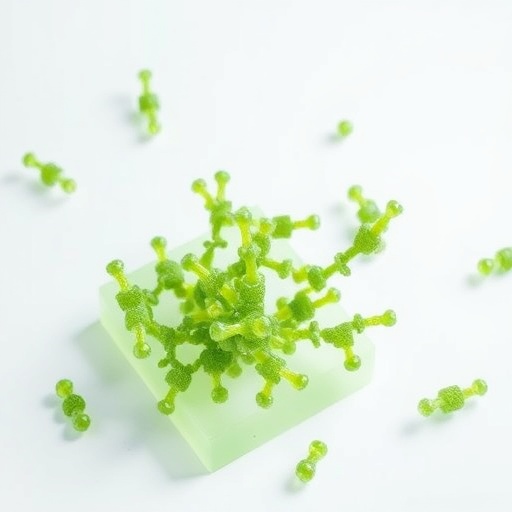In a groundbreaking advancement for functional food science, researchers have unveiled the vast potential of sulfated polysaccharides derived from microalgae, positioning these biopolymers as a promising frontier in nutritional innovation. The study, published in Food Science and Biotechnology, rigorously explores the nutritional and bioactive properties of these complex carbohydrates, paving the way for new applications that may redefine health-promoting dietary options.
Microalgae, microscopic photosynthetic organisms thriving in diverse aquatic ecosystems, have long attracted scientific interest due to their rich biochemical profile. Among their bioactive constituents, sulfated polysaccharides have emerged as molecules of significant interest. These highly sulfated, structurally diverse polysaccharides are known for unique physiological effects, which the research team harnessed to investigate their potential integration into functional foods.
Sulfated polysaccharides from microalgae are characterized by the presence of sulfate groups covalently attached to sugar residues, a modification that imparts unique physicochemical and biological properties. This sulfation enhances their water solubility and confers biological activities such as antiviral, anticoagulant, and antioxidant effects. The study delves into the structural intricacies of these biopolymers, revealing how specific sulfation patterns correlate with their functional benefits.
One of the study’s pivotal insights includes the elucidation of the microalgal sulfated polysaccharides’ nutritional value alongside their bioactivity. Unlike purely synthetic additives often used in functional foods, these natural polymers can offer both health benefits and essential nutrients. Their incorporation into food products could complement current dietary regimes aiming to combat chronic diseases linked to oxidative stress and inflammation.
Antioxidant activity is a major focus of the research, with findings indicating that sulfated polysaccharides scavenge reactive oxygen species effectively. This activity is crucial because oxidative stress is a known contributor to numerous ailments, including cardiovascular diseases and cancer. Hence, these natural antioxidants in microalgae could serve not only as nutritional supplements but also as preventive agents embedded within daily food intake.
Moreover, the antiviral potential of these polysaccharides profoundly captures attention amid a global context where viral infections dictate public health strategies. The sulfated moieties mimic cellular receptors, competitively inhibiting virus binding and entry. This mechanism suggests a novel route through which functional foods might support immune health by limiting viral proliferation pathways in the gastrointestinal tract.
The anticoagulant properties also merit consideration, offering an alternative to traditional blood-thinning agents. Unlike pharmaceutical anticoagulants, which can have adverse side effects, natural sulfated polysaccharides may provide safer options to regulate thrombosis risks. Their ability to modulate coagulation cascades is intricately linked to sulfate density and molecular weight, parameters meticulously analyzed by the research.
The research employs advanced analytical techniques such as nuclear magnetic resonance (NMR) spectroscopy and mass spectrometry to characterize these polysaccharides. Such in-depth chemical profiling is essential for understanding the structure-function relationships that govern their biological activities, enabling the design of tailored microalgal extracts for targeted functional food applications.
Importantly, the sustainability aspect of microalgal sulfated polysaccharides cannot be overstated. Microalgae cultivation offers an environmentally friendly alternative to terrestrial crops, utilizing minimal land and water resources while fixing carbon dioxide efficiently. This renders the use of microalgal derivatives as a renewable resource highly attractive in the context of global climate change and resource depletion challenges.
The study proposes several avenues for practical application, including incorporation into beverages, dietary supplements, and functional food matrices tailored for specific health benefits. Functional foods augmented with these polysaccharides could revolutionize preventive healthcare by seamlessly integrating bioactive compounds into everyday diets.
However, challenges remain in scaling production economically and maintaining bioactivity post-processing. The researchers emphasize the necessity for optimization in extraction methods, preservation of sulfation patterns during food processing, and ensuring bioavailability upon ingestion. Addressing these issues is critical to translating benchside promise to commercial viability.
Consumer acceptance is another focal point. While demand for natural and health-promoting foods is surging, the sensory attributes of microalgal polysaccharides need refinement to minimize any off-flavors or textural issues that could hinder widespread adoption. Innovations in formulation science will be paramount to overcoming such barriers.
In conclusion, the exploration of microalgal sulfated polysaccharides represents a multifaceted breakthrough, combining nutrition, bioactivity, sustainability, and food technology. This research ushers in a new era where oceanic microorganisms could underpin the next generation of functional foods, offering scalable, natural solutions to some of humanity’s most pressing health challenges.
As global health paradigms shift toward prevention and well-being, integrating such novel biomolecules into public diets could significantly impact the incidence of chronic disease and vitality outcomes. Continued interdisciplinary research and collaboration will undoubtedly accelerate the transition of these findings from laboratory insight to functional pantry staples worldwide.
This pioneering study not only broadens our understanding of microalgal biochemistry but also highlights the untapped reservoir of marine bioresources ready to be harnessed for human health. Through sophisticated scientific inquiry and innovative application, sulfated polysaccharides may soon transform from niche research subjects into mainstream contributors to global nutrition and wellness.
Subject of Research: The nutritional and bioactive potential of microalgal sulfated polysaccharides for functional food applications.
Article Title: Exploring the nutritional and bioactive potential of microalgal sulfated polysaccharides for functional food applications.
Article References:
Sofyantoro, F., Prasedya, E.S., Nurkolis, F. et al. Exploring the nutritional and bioactive potential of microalgal sulfated polysaccharides for functional food applications. Food Sci Biotechnol (2025). https://doi.org/10.1007/s10068-025-02031-6
Image Credits: AI Generated
DOI: 10.1007/s10068-025-02031-6




